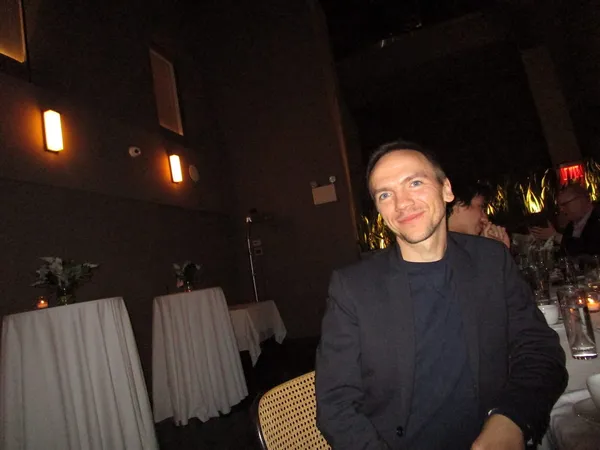 |
| Corpus Christi (Boże Ciało) director Jan Komasa: "I was looking for a moment in the film that sort of detaches from just storytelling.” Photo: Anne-Katrin Titze |
During dinner at Il Gattopardo across the street from the Museum of Modern Art in New York, Corpus Christi (Boze Cialo) director Jan Komasa told me that he is a “big fan” of Andrey Zvyagintsev and his films Loveless and Leviathan. Jan’s composers Evgueni Galperine and Sacha Galperine also scored François Ozon's By The Grace Of God and Barry Levinson’s The Wizard Of Lies, starring Robert De Niro and Michelle Pfeiffer with Alessandro Nivola on the Bernie Madoff scandal.
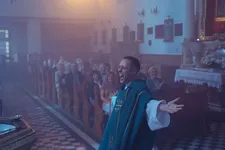 |
| Jan Komasa on Bartosz Bielenia: “In Warsaw now he is part of Krzysztof Warlikowski, very renowned European theatre director - he is part of his troupe.” |
Corpus Christi, screenplay by Mateusz Pacewicz, stars Bartosz Bielenia (from Krzysztof Warlikowski’s theatre troupe) with Eliza Rycembel, Tomasz Zietek, Aleksandra Konieczna, Jan Hrynkiewicz, Leszek Lichota, and Lukasz Simlat. Bartosz recalled for me Matthieu Carrière in Volker Schlöndorff's Young Törless and Jan noted that Christopher Walken is how he is seen in Poland when I brought up the intensity of his gaze.
Based on real events, Corpus Christi had its world première at the Venice Film Festival (winner of the Label Europa Cinemas and Edipo Re Awards) and screened at the London Film Festival earlier this month.
We first meet Daniel (Bartosz Bielenia) in juvenile detention. The dynamics among the young men are brutal and violence among the inmates is rampant. Daniel’s respite lies in the church. So much so that he sees it as his calling. The priest he admires tells him that this path is closed for someone like him. Upon his release he is about to start a job at a sawmill in rural Southern Poland when an unexpected opportunity arises to fulfil his dream. Can an impostor priest change a grieving community? With toughness and soulfulness, Daniel confronts his “if only…”
Corpus Christi is Poland’s Oscar submission for the 92nd Academy Awards.
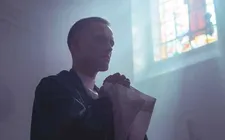 |
| Bartosz Bielenia as Daniel in Jan Komasa’s Corpus Christi (Boże Ciało) |
Anne-Katrin Titze: The music in your film I am curious about. Did you see François Ozon's By The Grace Of God?
Jan Komasa: Of course.
AKT: With your composers, who also did the Madoff film The Wizard Of Lies.
JK: Evgueni Galperine [and Sacha Galperine] composed music not only for François Ozon but also in Zvyagintsev's film Loveless. Last year's Oscar contender as well. Oscar nominee, sorry. So I'm a fan of Zvyagintsev.
I saw Leviathan and I was inspired by Leviathan, especially concerning Corpus Christi because it's a small town, the society in a nutshell theme. So the music in Corpus Christi is very minimalistic. That was the goal. How he managed to do it is, he was working with broken church organs.
AKT: Broken church organs?
JK: Yes, so there is this squeal at the end. Also he used this wooden sound design, like wood being sawed.
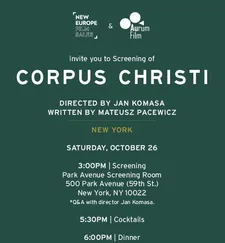 |
| Corpus Christi screening and dinner invitation |
AKT: So that's the sawmill connected to the church?
JK: Yes, and out of it he pulled this music, his own theme in the film.
AKT: It's effective.
JK: And at the end there's this violin which was used from Zvyagintsev's film music. That Zvyagintsev didn't use in Loveless. He said he loved this particular part but he couldn't find any place to use it and he said that maybe we can use it. And it fit perfectly at the end, the sequence.
AKT: So you inherited it!
JK: I'm happy to have Zvyagintsev's music in my film.
AKT: What about the song that the girl [Eliza, played by Eliza Rycembel] is singing? It seems like a folktale. She sings of three brothers?
JK: I was looking for a moment in the film that sort of detaches from just storytelling. So that we can just hang and linger for a while. The song is at the high time of his being in the village. That's what he was aiming to do. He found his community. They're accepting him. And then maybe this little moment of the song, the music, soothing the spirit. This song is a folksong from the region we were in.
AKT: What's the region called?
JK: Podkarpacie, which is down south of Poland. Mountain region, very conservative region. This song had this melancholy quality I felt would be good. It wasn't supposed to be heart-warming, but at the same time it's melancholy.
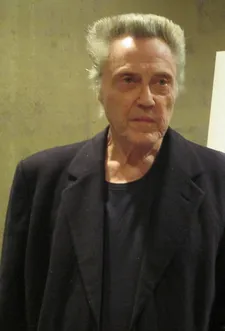 |
| Jan Komasa on Bartosz Bielenia and the intensity of the gaze: “Yes, those huge amazing eyes. People in Poland have told Bartosz "Christopher Walken!’” Photo: Anne-Katrin Titze |
AKT: I liked how it didn't completely match, but you included a shot of three guys looking at her. Tying in the story with ancient customs, as if fake priests have been going around Poland forever.
JK: For ages! Yes, that's true. Basically, these meanings came as we went. We didn't plan it. Finally we have the shot and she started to sing and I go "Oh, three brothers!" I didn't know that before. Intentionally I play with the meanings as we were filming.
AKT: You were saying there were lots of fake priests in Poland. Just in Poland? Is that something widespread?
JK: Not just in Poland, but I believe there are several cases each year in Poland, cases of fake priests. Especially in small communities. It's easier to cheat people when they don't have access to the internet. The isolation serves the people who are keen on manipulating others, definitely. If you have a sect, the first thing the guru of the sect does is to isolate.
AKT: Some shots, when you show people walking in the village, it could be taking place one, two hundred years ago.
JK: It's a particular village in Poland which basically is taken care of by the conservators. You can't change anything in the architecture. It's a chain of a few villages. Their look is very distinct.
AKT: It creates a nostalgia for the "old times", simultaneously you show what that means for the people living there.
JK: Also the status quo. Which means to be untouched by the revolutionary. Like this stranger appears in town and proposes the new take, obviously the status quo feels threatened by this approach.
While we were shooting in the village there were a lot of children who moved away from there. They didn't want to be in the village anymore with their parents and grandparents. So there was this loneliness notion. They felt left alone. They feel like being treated unfairly by life.
AKT: The actor [Bartosz Bielenia] in the main part, playing Daniel, you said is mainly a theatre actor. What are some of the roles he played on stage? He is very impressive, very present.
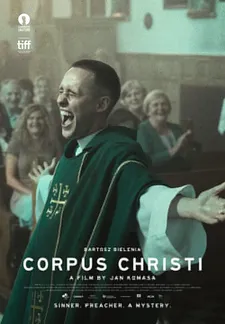 |
| Corpus Christi poster - Poland’s Oscar submission for the 92nd Academy Awards |
JK: He played basically in contemporary new plays. I haven't seen his roles in Krakow, the down south big city in Poland with a huge theatre tradition. There's one theatre called the Old Theatre, he was a part of the ensemble.
In Warsaw now he is part of Krzysztof Warlikowski, very renowned European theatre director - he is part of his troupe. He plays, I believe in three different productions. He is super successful in theatre. And the film industry had a problem with people like Bartosz. He is too characteristic to play the leading role.
AKT: Because he is too much?
JK: Yes.
AKT: There were a few moments when I had to think of the actor Matthieu Carrière who played in Volker Schlöndorff's first film, Young Törless. The eyes, the intensity of the gaze.
JK: Also Christopher Walken.
AKT: Christopher Walken?
JK: Yes, those huge amazing eyes. People in Poland have told Bartosz "Christopher Walken!"
The shortlist of ten Best International Feature Films will be announced by the Academy of Motion Picture Arts and Sciences on December 16.





















